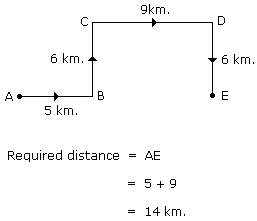Discussion
Home ‣ Verbal Reasoning ‣ Statement and Assumption See What Others Are Saying!
- Question
- Statement:
The finance ministry freshly brought out a hug revenue deficit because customs and excise have done badly due to severe industrial slowdown.
Assumptions:
I. Excise and customs has a good stake in revenue collection of the government.
II. Customs and excise has a strong link- up with industrial performance.
Options- A. if only assumption I is implicit.
- B. if only assumption II is implicit.
- C. if either I or II is implicit.
- D. if neither I nor II is implicit.
- Correct Answer
-
ExplanationThe way the poor performance on excise and customs fronts has been shown to be the cause of the "huge revenue deficit" makes I implicit. Similarly, II is implicit from the way it affected customs and excise.
- 1. Assertion (A):
The average temperature of the Earth has been rising.
Reason (R):
The greenhouse effect traps the Sun's heat within the Earth's atmosphere.
Options- A. Both (A) and (R) are true, and (R) is the correct explanation of (A).
- B. Both (A) and (R) are true, but (R) is not the correct explanation of (A).
- C. (A) is true, but (R) is false.
- D. (A) is false, but (R) is true. Discuss
- 2. PORTFOLIO
Options- A. RIFT
- B. ROOF
- C. FORT
- D. PORTICO Discuss
- 3. 25 : 625 : : 35 :?
Options- A. 1575
- B. 1205
- C. 875
- D. 635 Discuss
- 4. Contiguous : Abut
Options- A. Possible : Occur
- B. Synthetic : Create
- C. Simultaneous : Coincide
- D. Constant : Stabilise Discuss
- 5. Typist : Typewriter : : Writer :?
Options- A. Book
- B. Paper
- C. Script
- D. Pen Discuss
- 6. Choose the word which is different from the rest.
Options- A. Cot
- B. Sheet
- C. Quilt
- D. Pillow
- E. Blanket Discuss
- 7. Statements:
L ? M < N > O ? P
Conclusions:
I. O < M II. P ? N
Options- A. If only conclusion I follows
- B. If only conclusion II follows
- C. If either conclusion I or II follows
- D. If neither conclusion I nor II follows Discuss
- 8. If South-East becomes North, North-East becomes West and so on. What will West become?
Options- A. North-East
- B. North-West
- C. South-East
- D. South-West Discuss
- 9. Shyam walks 5 km towards East and then turns left and walks 6 km. Again he turns right and walks 9 km. Finally he turns to his right and walks 6 km. How far is he from the starting point?
Options- A. 26 km
- B. 21 km
- C. 14 km
- D. 9 km Discuss
- 10. If A stands on his head with his face towards north, in which direction will his left hand point?
Options- A. North-East
- B. North
- C. East
- D. North-West Discuss
More questions
Correct Answer: Both (A) and (R) are true, and (R) is the correct explanation of (A).
Explanation:
The reason is an important factor for the Earth's warming.
Correct Answer: PORTICO
Explanation:
'PORTICO' word cannot be formed from 'PORTFOLIO' due to the absence of letter 'C'
Correct Answer: 635
Explanation:
As, 25 : 625 ? 25 is common in both and 6 is added before it.
Similarly, 35 : 635 ? 35 is common in both and 6 is added before it.
Correct Answer: Simultaneous : Coincide
Explanation:
Both the words are synonyms of each other.
Correct Answer: Pen
Explanation:
Second is the device used by the first.
Correct Answer: Cot
Explanation:
Correct Answer: If neither conclusion I nor II follows
Explanation:
If neither conclusion I nor II follows
Correct Answer: South-East
Explanation:

It is clear from the diagrams that new name of West will become South-East.
Correct Answer: 14 km
Explanation:

Correct Answer: East
Explanation:
If a person stands on his head with his face towards north, his left hand will point towards east.
Comments
There are no comments.More in Verbal Reasoning:
Programming
Copyright ©CuriousTab. All rights reserved.
